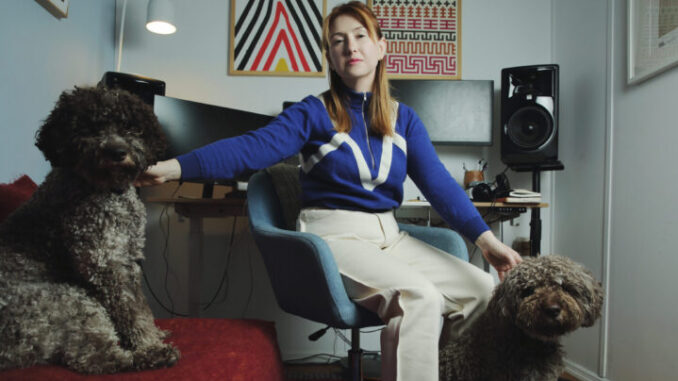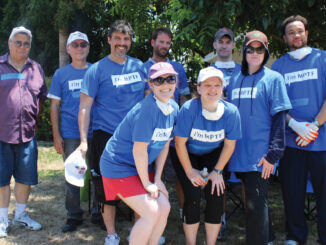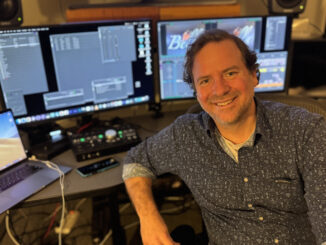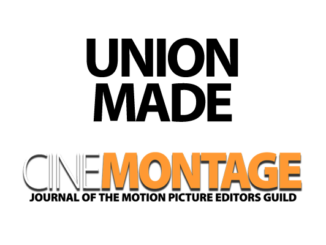
Where are you currently employed?
I am a freelance music editor in Brooklyn, NY. The majority of my work occurs remotely in my studio in DUMBO (Down Under the Manhattan Bridge Overpass). I join directors and editors during spotting sessions and music reviews. In spotting sessions, the director, post-producer, picture editor and I review the film scene by scene and identify the exact moments on screen that require music. Music reviews are discussions about whether a specific piece of music is working for a scene and how (if necessary) it could be improved to be more emotionally resonant. I attend final score recording sessions with composers. I also work in person at dub stages during final re-recording mixes. That’s when I catch up with my colleagues in the sound department and problem-solve music matters on the fly.
Current projects?
I recently started working on a musical/rock-opera titled “O’Dessa” that will be released in early 2025. Earlier this year, I collaborated on a feature, “The Friend,” that will premiere at the Toronto International Film Festival (TIFF) in September. I also worked on an A24 fantasy film, “Death of a Unicorn,” and about a month ago, I wrapped up the final mix on a horror film from New Regency.
Describe your job.
Music editor is a vesica piscis between picture, sound and music departments. You get to work with the director/showrunner on creating a temporary music score that establishes the emotional and stylistic languages of the project. You then work closely with the composer on developing, organizing, recording and showcasing their original material. You work in tandem with music supervisors on selecting and presenting source material and needledrops. You are heavily involved during the final mix, providing any support that the sound team and re-recording mixer might need.
Who gave you your first break?
It took a while. Unfortunately, there is no longer a formal path to becoming a music editor. Barely any projects have a budget for an assistant music editor, a position where you can learn more about the craft while tangibly and practically being of help in a music department. In addition, my schooling was not in the film world, but in arts and music. I have had two viable, involved creative careers before transitioning into film. In retrospect, I think it was helpful to have worked in visual arts first, in order to conceptually be able to bridge music and moving image. However, I had no understanding of how the post-production process worked or how to break into this field. After years of my futile bounced cold-call emails to other music editors in NY, a veteran editor, Dan Farkas, took a chance and arranged for me to shadow him. First, I was a fly on a wall on the “Warrior” TV series, just watching him work. Sometime later, I assisted him on a Netflix TV series, “The Sinner.”
What was your first union job?
It was a small horror feature: “You Should Have Left” by Blumhouse Productions. I was hired for the final three weeks of the project: get the score ready for the mix; the re-recording mix itself; and a few days of preparing music deliverables/wrap-up.
What credits or projects are you proudest of, and why?
All of them. A) I still don’t believe I get to do the job that I love, considering how impenetrable this field seemed earlier in my career. B) Every single credit means so much because I get to learn more about myself and grow as a professional through every project.
What was your biggest challenge in your job (or on a particular project) and how did you overcome/solve it?
Most of my challenges are self-inflicted, and the only way to overcome them is to keep working. I tend to improve professionally by embarking on new projects.
What was the most fun you’ve had at work?
I’m having a great time on a project I’m currently working on. Although I joined the team after the score was mostly finalized, I get to attend recording sessions and score mixes. It’s such a significant part of the process because we bring to life the story and characters on the screen through balancing the elements, augmenting harmonies and refining the blend of instruments. For example, there was a rather solemn scene with a heavy brass instrumentation underscoring the moment, but by highlighting certain synth textures, we managed to tie together the hero’s grief to a dream-like vision that is woven into the final act. This has allowed us musically to bookend the tale in the most cohesive manner.
Jobwise, what do you hope to be doing five years from now?
The ultimate hope is to learn how to have more fun at work in whatever form the job takes.
What are your outside activities, hobbies, passions?
I keep my hand on the pulse of sonic art installations and multi-sensory experiences that involve music —and taste buds! I’m about to start an online course taught by a Michelin-star chef that explores relationships between taste, sight and sound. I am very curious how all human senses are connected (which in a weird way is an extension of what I do professionally). I also have two Lagotto pups that keep me very busy. They are very musical dogs, and I love coming up with marching tunes for our leash walks; it’s hard to believe it, but I find that they behave better on the leash if I sing or whistle to them.
Favorite TV program(s)? Why?
I am a big fan on Noah Hawley’s projects. Whether “Fargo” or “Legion,” he makes outstanding music choices!
What advice would you offer to someone interested in pursuing your line of work?
In my opinion, it’s a three-dimensional career.
There is a technical aspect and importance of keeping up with the latest music technologies, Pro Tools releases, new audio plugins, music libraries, cue sheet maintenance software, deliverables requirements, etc.
There is a social aspect. Being able to read the room. Picking up on nuances and intricacies of workplace dynamics. Establishing a rapport with director, producers, pictures editors, AE’s, sound department, music supervisor, composer. It’s a delicate web of collaborations and ideas where everyone wants to be heard.
There is a conceptual ingredient. All your creative choices are meant to support the story unfolding on the screen. Therefore, you have to have a broad knowledge base of music aesthetics and styles to underpin your technical and theoretical choices.
Was there ever a circumstance when you had to rely on the Guild for help or assistance?
There was a small project early on in my career that didn’t work out the way I had hoped it would. The East Coast branch representative at the time stepped in and advocated on my behalf. They also made sure that all contractual obligations were fulfilled by the hiring party, which I would have overlooked due to my inexperience.
Is there anything you’d like to say to your fellow Guild members, some words of encouragement?
I sincerely hope the industry will bounce back in the next six months and everyone will return to work. Crossing fingers for 2025 to become the new Golden Age for Film and TV — although perhaps not Golden, but a Copper Age? It seems to be the most in-demand metal for clean-energy technologies right now, so let’s hope there is a sustainable future for all of us in the Guild.
Compiled by David Bruskin.





